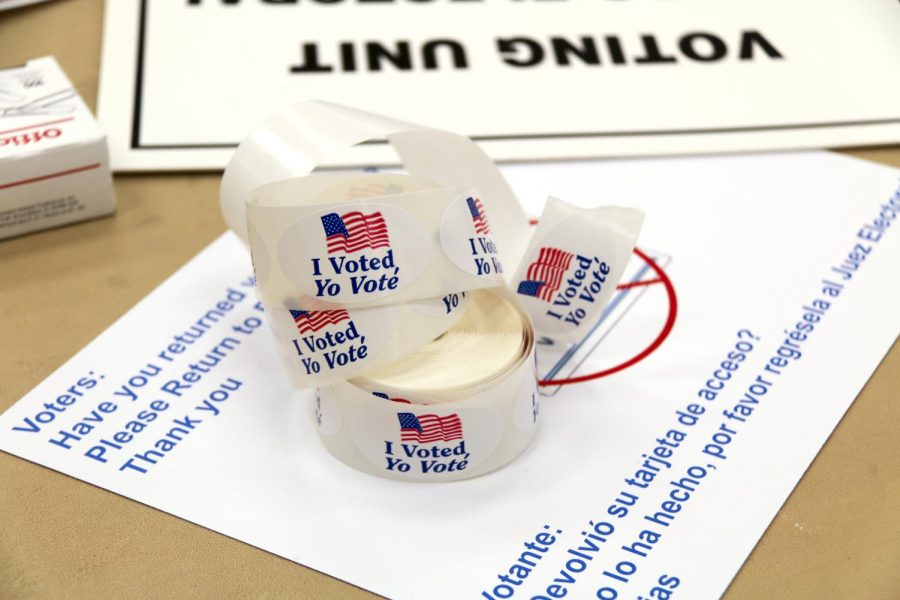It’s time to vote local
Local advocacy can be more impactful than participating in the national election conversation
September 24, 2020
Despite the fact that there over half a million elected officials in the U.S. today, only 537 of them — just over 0.1% — are federal employees. The majority are found on the local and state level — in courts, school boards, city councils and more — yet only a few, like the president, are constantly in the public eye. Local elections do not enjoy the same media coverage as their national counterparts. This affects voter turnout; in 2018, only 27% of eligible Americans nationwide voted in the average municipal election.
One cause for our disproportionately national interest is the evolution of the news media. According to the Pew Research Center, over 70% of respondents in 1990 consumed local T.V. and newspapers, but by 2014, that figure fell below 50%. In the same time period, the fraction of respondents consuming online news increased by more than threefold. University of Pennsylvania professor Daniel Hopkins asserts that as Americans favor national media — cable news, social media and the internet — over local media, their investment in local elections decreases. Local publications also die out, leaving large news deserts with little to no media coverage.
Local voter turnout is directly correlated with adequate media coverage, which small-scale publications offer. In fact, these publications are often limited to reporting within the confines of their community due to circulation and distribution reasons. Online and cable news outlets, on the other hand, thrive on the relevance and sensationalism of national politics. This pattern creates a positive feedback loop of increasing attention on national politics — particularly presidential elections — which, when coupled with the tropes of populism, socialism and Trump that are continually ingrained into popular imagination by the media, leaves local systems largely ignored.
National elections are not the panacea for actually effecting change.
However, national elections are not the panacea for actually effecting change. There’s no denying that they’re important: voting is as much a civic duty on the national level as it is locally, and who we elect as president can set cultural precedents for nationwide issues like climate change and racial equality. As citizens, we share a responsibility to vote for who we believe will best serve the interests of all Americans — not just our own communities.
But in the realm of policies, county, city and state level elections are more likely to create noticeable changes in our daily lives. Local governments administer our schools, our infrastructure and the laws we abide by; they control our police departments, our public transit and affordable housing options. For this reason, citizens often have greater agency in effecting change when voting locally.
Sometimes, our local and state laws can take precedence over federal laws. Proposition 16, for example, is a new ballot proposition that repeals an existing Californian law that prohibits discrimination on the basis of race, sex, color, ethnicity and national origin. It’s probably best known to MVHS students through viral posts about its supposed impact on UC admission rates. Yet there lies a multitude of nuances beneath that. The law does not simply concern college admissions, but any and all government treatment towards any specific group; it was put in place to combat unfair discrimination.
Contrary to popular belief, Proposition 16 will not institute racial quotas — those were ruled unconstitutional in 1978 by the U.S. Supreme Court. But it can improve equal opportunity and encourage social mobility by calling into question the potential racism lurking in many institutions. In the general election this November, Californians must decide whether or not the loss of that law is worth the potential policies that may be permitted as a result. There is always more nuance in complicated issues than what may appear at first; therefore, we should not blindly parrot what we find on social media or even what large news organizations tell us.
The lifeblood of democracy is that individuals educate themselves and form their own opinions rather than mindlessly following what others tell them to believe. That’s especially true on the local level, where policies have the potential for immediate change. Even if the presidential candidate or Congressperson we hope for does not get elected, our voices can still find meaning through local participation and action.
The upcoming election is an opportunity for us to take the initiative to educate ourselves on who our candidates are and what policies they hope to enact. Cupertino residents will have the opportunity to vote for ballot measures, City Council candidates and FUHSD board members. Their votes will impact how distance learning, transportation and housing prices — issues relevant to many Cupertino residents — are resolved. For our advocacy to find meaning, we must educate ourselves to the fullest extent on these policies beyond the reductionist views we may hear from others.
So go out and learn about your local system — explore this issue’s News package on elections; reach out to your city and state candidates and ask them questions or share your concerns. Read their policies and think deeply about how they may affect your community before jumping to conclusions. And when the need for change arises, don’t forget that voting locally, within our own communities, can be more impactful and tangible than we may believe.
















